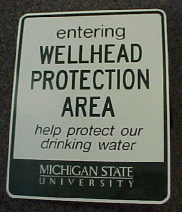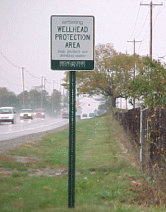Public Education and Participation
Educating the community about groundwater protection is an essential component of a WHPP for several reasons. First, MSU will receive more support and encouragement from the local community regarding drinking water protection if community members are educated about the program. Second, MSU students, faculty, staff and visitors will learn how to protect their drinking water source. Third, in the event of an emergency, the University will be better prepared and equipped to deal with the situation.
Personnel Training
The MSU Wellhead Protection team has created an online training module to train employees on WHPP elements. Increased use of the training module is a priority outreach and education goal of the WHP team. Staff members who are encouraged to complete the training module include HAZMAT response team members, farm managers and staff, waterworks operators from the Department of Power and Water, IPF Landscape Services staff, and MSU Police staff members. Familiarity with the campus water supply/ distribution system, the WHPAs, and the contingency plan details will be crucial should an emergency situation arise.
Farm Managers Annual Meeting
WHP program updates are provided to south campus farm managers at their annual meeting as necessary each winter. This training includes any updated information regarding WHPAs, reminders to complete the online training program, and any other relevant source water protection information deemed important by the WHP committee.
Other Training Programs
EHS provides annual training to the East Lansing Fire Department and MSU EHS staff members. WHP information is included in this Rapid Assessment Team training periodically.
Develop Public Visibility of the MSU Commitment to Wellhead Protection
Wellhead Protection Signs
Michigan State University has increased public visibility of their wellhead protection areas with the addition of signs which read: Entering Wellhead Protection Area. These signs are located along major roadways which lie on the southern portion of campus. In total, there are eight signs which illustrate to the public that MSU participates in a Wellhead Protection Program.


Groundwater Guardian
 Michigan State University was officially recognized as a Groundwater Guardian in 2002, and to date is the only participating University in this national program. An initiative of The Groundwater Foundation based in Lincoln, Nebraska, the Groundwater Guardian Program was developed to recognize communities that are taking an active role in protecting their local groundwater supplies. Groundwater Guardian status is granted annually to communities that remain actively involved in protecting their drinking water. MSU has been designated annually since its inaugural year.
Michigan State University was officially recognized as a Groundwater Guardian in 2002, and to date is the only participating University in this national program. An initiative of The Groundwater Foundation based in Lincoln, Nebraska, the Groundwater Guardian Program was developed to recognize communities that are taking an active role in protecting their local groundwater supplies. Groundwater Guardian status is granted annually to communities that remain actively involved in protecting their drinking water. MSU has been designated annually since its inaugural year.
Consumer Confidence Report
The Consumer Confidence Report (CCR) is provided to all water consumers on the Michigan State Campus. The CCR outlines specific information about the MSU water system and water quality. This document is available online at the IPF website: http://ipf.msu.edu/green/water/water-quality-report/index.html

